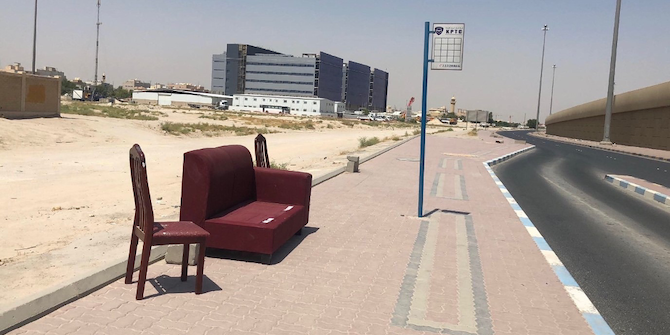by Shaikha Al-Hashem and Geoffrey Martin

How will the COVID-19 pandemic impact plans for a post-oil economy in Kuwait?
Kuwait’s response to the pandemic has been one of the strictest in the world, proactively closing non-essential services, ensuring food security in cooperative grocery stores, holding daily updates on the virus, quarantining of highly infected districts, and repatriation of 31,000 citizens. A partial curfew has been in effect since early March and since 10 May a full curfew has been imposed. As of 19 May there were a total of 16,764 cases, 4,681 recovered, and 121 deaths. While no-one knows the true cost of the struggle to contain the virus, sources in the Ministry of Health predict approximately 400 to 7,000 casualties depending on success of social distancing measures.
So far the Central Bank of Kuwait has announced the most timid stimulus package in the Gulf, merely reducing interest rate cuts and providing limited mortgage relief, soft loans for SMEs and deferral of loans for residents. With over 500,000 expatriates likely to leave the country in the coming year, oil prices plummeting to historic lows, and states’ resources strained under the burden of dealing with the health crisis the already rough road to realising the country’s ‘Vision 2035’ is looking even bumpier.
Vision 2035 for a ‘New Kuwait’ is Emir Sheikh Sabah Al-Ahmad Al-Sabah’s vision to transform Kuwait into a financial and commercial hub by placing the private sector at the forefront. Separated into five-year development plans and 7 pillars, the vision is very ambitious. Entering its third phase which focuses on a dynamic private sector, the development plan’s execution in its current configuration is almost impossible amidst the unprecedented challenges brought forth by the pandemic. This was clearly reflected on 9 May when the Emir highlighted the seriousness of the situation in his annual Ramadan speech, cautioning the government to be wise and effective with resources and cut back on expenditures immediately.
A couple of days after the Emir’s speech, his son Sheikh Nasser Sabah published an op-ed titled ‘Reviving the Port’. He stated clearly the need to develop the plan more quickly as the best long-term solution to Kuwait’s dependency on oil. The first phases have faced challenges because of the hostile relationship between the government and parliament, and the unwillingness of the merchant class to take the plan seriously. Sheikh Nasser called the pandemic a blessing in disguise, hoping it would expedite the Vision and the development of the strategic northern Gulf port.
However, to develop the port, we think policymakers need to factor in a more pressing issue: the outflow of high skill expatriate labour precipitated by the pandemic. This should be at the top of their policy agenda. Specifically, the costs of losing this labour has consequences on the knowledge transfer and technology spillover required to make the Vision reality.
Information about the overall costs of the crisis on skilled labour is still fresh. A likely pattern resulting from the pandemic is a gradual repatriation of most high-skilled labourers that come from countries with good healthcare systems, as concerns about treatment in other countries raises concerns about the safety of living abroad. This is especially the case for ‘second career’ expatriates, often over the age of 55, as well as anyone with potential health problems. This is a significant class of people in Kuwait, often occupying various management positions and scouted from reputable companies abroad.
The authors spoke to different stakeholders in Kuwait, including ambassadors, trade attachés, bankers, investors and others in the business community, to assess the impact of COVID-19 on high-skilled labour. The results were stark and highlighted the seriousness of the situation concerning Kuwait’s future plans.
For example, there are approximately 1–1,200 Australian nationals living in Kuwait, with the group divided into three categories. Short-term residents often work in gyms, physiotherapy, and the hospitality and retail sectors. Of this group, 1–200 left prior to the airport’s closure. Being employed in the hardest hit sectors and often without deep financial reserves, they were ill-equipped to weather the storm.
The second group is the medium-term residents, mainly employed in management positions in the construction, oil and gas industries, either as consultants or engineers, while others work in education. Most are dual passport holders (with Lebanese, Egyptian and Jordanian passports) who have lived in Kuwait for many years. Of the teachers, many left prior to airport closure – mainly unmarried, they do not have large salaries and were not prepared to deal with the uncertainty of schools opening after the summer. Many professors at universities have more security but are currently considering just seeing out the next few months and then leaving. Many in the construction and energy sectors have not had their contracts renewed, have been laid off or are preparing for it. In total perhaps 150–200 have left.
The last group is long-term residents who work in all sectors of the economy in critical positions. These are the most numerous, are also dual nationals, and are by far the most important in terms of economic output. Most are re-evaluating options, approximately 50 have left and many more are thinking about leaving. One source noted that ‘while they don’t want to leave, their money is drying up and their businesses are failing. Most of them are considering packing up and restarting their life in Australia.’ So overall, approximately 35–40 percent of Australians have left and many more are thinking about leaving in next few months.
We can see the brain drain starting in some of the other expat communities. Several hundred Canadian teachers have left for the same reasons many Australians did. A South Korean businessman revealed that a startling 70 percent of South Korean engineers he knew who work on numerous mega-projects, such as the Al Zour refinery, had left. This pattern is likely to result in gaps in design and management.
For other nationalities it is too soon to say. In the short-term the implications of policies towards Filipino nationals will be the most crucial, due to their dominance in the nursing and service sector. Likewise, Indian nationals fill key industrial, service and business positions. Tens of thousands of middle to upper class Indians have already left the country with their families, and likely will not return. In more encouraging news, American contractors who number over 13,000 (not including military personnel) have largely stayed in the country. According to the authors’ sources, the military contractors and business community have all decided to stay for now. Yet several hundred teachers have left, leaving gaps in the education system that will be difficult to fill. Sources at various European embassies confirmed the same pattern – while EU nationals have not yet left en masse, they will likely find it difficult to stay over the next six months due to increased economic pressure.
The group of nationals with the greatest economic impact are from Egypt – they are widely employed in all sectors but are also the most politically contentious. The economic and health downturn may be the primary factor behind losing high-skilled expats. However, just as significant is the xenophobia which has long lurked in national rhetoric before the pandemic, with MP Safa Al-Hashem being a loud advocate against the presence of expatriates. A surge in positive COVID-19 cases following the lockdown of the labour districts Jleeb Al Shouykh and Mahboula only seemed to strengthen her case and help her supporters place the responsibility for the crisis on expats.
The Kuwaiti government has been adamant about combating xenophobic behaviour, providing information in different languages, and providing medical care for all residents. But increasing news of the poor treatment of expats is filtering out of the country. In a connected world, xenophobic content is easily amplified and has economic implications. The government of the Philippines’ recent response to such incidents are an example of what could happen, where news of violence against domestic workers resulted in a supply delay of high-skilled nurses and personnel to staff the new Al Jaber hospital. If these situations are perpetuated, Kuwait risks its reputation as a place to come to work, especially for white-collar workers who already face recruitment disincentives including the hot weather and the alcohol ban. It will also likely lead to increased intervention into the sovereignty of Kuwait in terms of labour laws, litigation by external third parties, and make the import of labour far more burdensome.
Going forward we argue that addressing the status of high skilled labour at the macro-policy level at present is essential if Kuwait wishes to fulfil its Vision. In the post-COVID-19 world, recruiting high skilled labour and the battle for talent will likely be the most important national priority and links directly with creating a conducive atmosphere for foreign direct investment. Even if Kuwaiti nationals become more prominently employed in management of megaprojects, the population is simply too small and still requires a lot of technical training and education to begin to develop the economy without expatriate involvement.







Most of the comments here laud the wisdom of the article so they sound like they were written by the friends of one of the authors.
The sad and harsh reality of Kuwait is that it still keeps the expats chained to their Kuwaiti sponsors who charge them hefty sums just to stay in the country.
Many will not be sorry to leave the remnants of slavery behind.
Look up Kafeel system for those who are interested in reading up more.
Well written.
Well written … the conclusion is well said and implicitly reflected in the third KNDP
A well researched article and pragmatic analysis of the facts with an objective for the New Flourishing Kuwait!
Bravo…
A well organized analysis and substantial fact
Article from a person possessing a highly developed intellectual mind, who has broader view.
facts well written. we hope all goes well for Kuwait.
Very good writing and there is much wisdom in the Article for Kuwait to think and act for benefit of the Nation.
There is much wisdom in the Article to think and accordingly.
There is much wisdom in the writing of this Article to think and Act.
Interesting